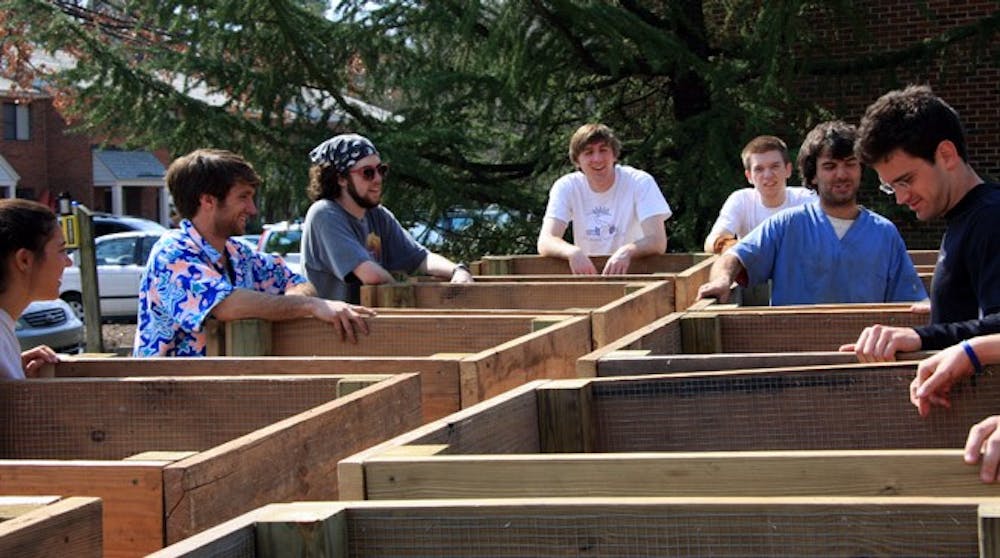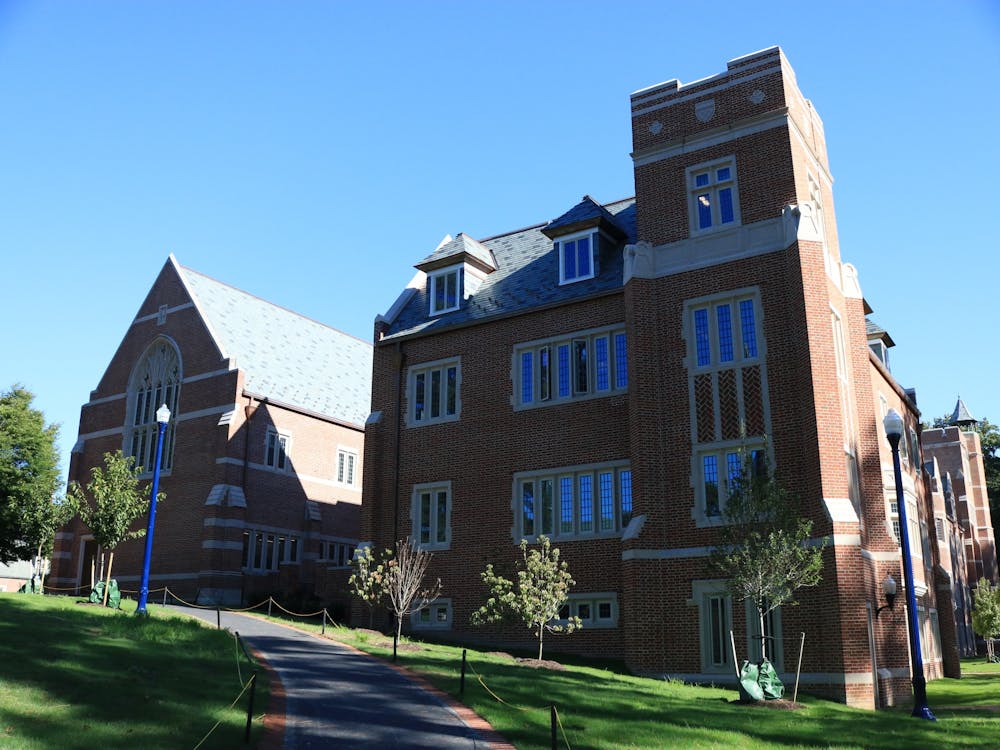All students need to do now to aid campus sustainability initiatives is save their food waste.
URot, a project of GreenUR, is the first student-run composting initiative at the university. Students from GreenUR and Backyard Farmer, a local business, constructed 10 composting units and one compost ingredient holding unit next to the 1900 block of the University Forest Apartments last Sunday.
The units will be operated by students and assisted by Backyard Farmer during the next year, with the goal to produce rich soil for the on-campus community garden, junior Michael Rogers said.
Composting is a process that turns biodegradable materials into vitamin-rich soil for gardening and agriculture. Senior Carly Vendegna, co-president of GreenUR, said she envisioned students living in the apartments saving certain types of food waste in biodegradable bags, which would then be regularly deposited in the composting holding unit. Acceptable food waste includes coffee grounds, tea bags, egg shells and vegetables; meat, bones and oil will not be allowed because they do not decompose as easily.
The installation of the composting bins is the culmination of months of collaboration between GreenUR, Backyard Farmer, the Earth Lodge program and University Facilities, which cleared the land needed for the composting units, Rogers said. Beginning in September 2009, students discussed the possibility of pursuing a composting project because it logically followed the implementation of recycling programs on campus. The apartments were chosen as a location for the composting units because students in the apartments would produce more food waste.
Trey McDonald, campus sustainability coordinator, said the compost initiative idea came from Rogers, who contacted Backyard Farmer, a Greater Richmond-area company, for assistance.
Backyard Farmer designs, builds and maintains gardens and educates people so that they are able to grow their own food. Last fall, it hosted a compost education event at The Forum, at which time GreenUR collected more than 120 signatures of students, staff and faculty in support of the compost project. The company will also host workshops for students during the next year so that they may learn how to compost on their own.
Rogers said he hoped the project would educate students about the benefits of composting and help more people understand that composting can help start a garden. Composting is also a valuable life skill that should be learned by college students, many of whom will be living on their own soon, Vendegna said.
"I think the real success of this program may not be measured by how many people start composting their food," Rogers said. "While I do want everyone to participate in composting and gardening, I think that true success will be when students, faculty, staff and people from the surrounding neighborhoods are all working together to create new ways to apply sustainable ideals to their daily lives."
Freshman Ana Neferu said composting was similar to recycling, but with organic materials.
"Composting is important because people throw away stuff all the time, so why not get something out of it?" she said.
The composting process requires a diversity of products and the correct proportions to succeed. Tim Adkins of Backyard Farmer said each compost bin would contain 60 percent dry, carbon products, such as hay, sawdust, wood chips, paper and leaves; 30 percent wet, nitrogen products, such as food waste, vegetables, coffee grounds and grass clippings; and 10 percent soil. The alternating layers of carbon and nitrogen will absorb gases that produce odors, Rogers said.
Enjoy what you're reading?
Signup for our newsletter
Once the soil is produced, it will be used in on-campus gardens. Faculty and staff currently operate 24 garden plots, and a similar one will be available to students beginning April 16, 2010. McDonald said students would be needed to oversee the garden during the summer months.
Alluding to small gardening beds he had seen appear on campus, Sean Sheppard of Backyard Farmer said the ultimate goal of the project would be to spread small-scale awareness. But Rogers said he hoped students would gain more than just knowledge from the project — he wants students to embrace the project and forge relationships with one another.
"Sustainable living takes creativity because it's counter to the dominant way of living," Rogers said. "I truly believe that we have the capacity for this sort of creativity, but we first need places to congregate that foster creative thought — I think this composting system may be that place. This whole program started with one conversation, and I'm excited to see how far the next one will take us."
THIS VERSION CORRECTS THE SPELLING OF "McDONALD"
Contact staff writer Jimmy Young at jimmy.young@richmond.edu
Support independent student media
You can make a tax-deductible donation by clicking the button below, which takes you to our secure PayPal account. The page is set up to receive contributions in whatever amount you designate. We look forward to using the money we raise to further our mission of providing honest and accurate information to students, faculty, staff, alumni and others in the general public.
Donate Now



